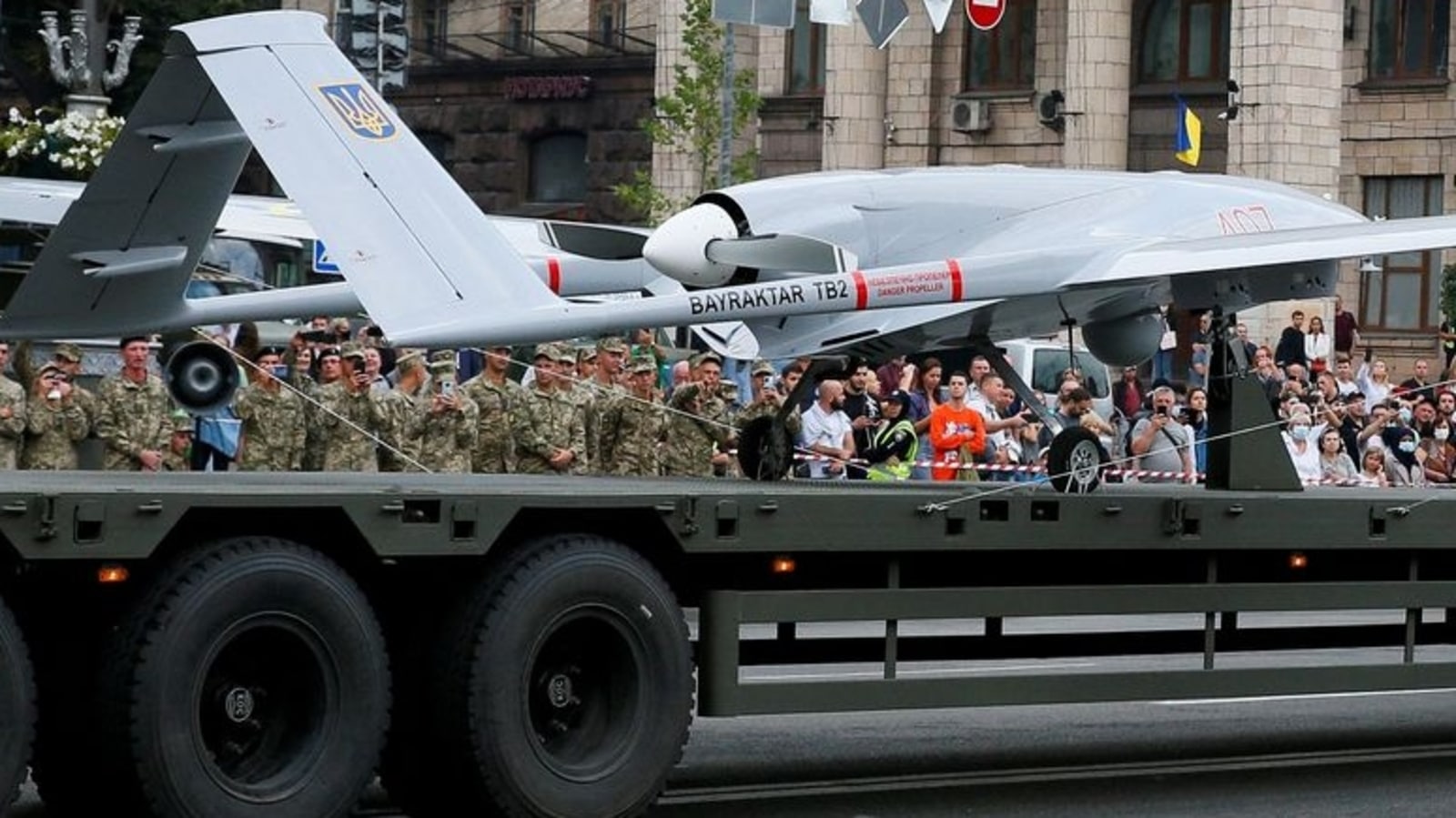In Ukraine war, Russia gets bloody nose from deadly Bayraktar TB2 drones from Turkey
The grainy aerial images of a destroyed Russian tank and missile batteries were, according to Ukraine’s air force, the latest evidence of the damage inflicted by its fleet of Turkish-made Bayraktar TB2 drones.

The grainy aerial images of a destroyed Russian tank and missile batteries were, according to Ukraine's air force, the latest evidence of the damage inflicted by its fleet of Turkish-made Bayraktar TB2 drones on Vladimir Putin's invading army.
In an English-language tweet Tuesday, Ukraine lauded the attack as “the jewelry work of Bayraktar TB2 crews,” saying it took place in the previous 24 hours at an undisclosed location. Since fighting started last week, Ukrainian claims have credited the pilotless aircraft with destroying dozens of Russian armored vehicles, missile systems and trucks.
While it's impossible to confirm a role for the drones in all those losses, it wouldn't be the first time planes made by Turkey's Baykar had a significant impact on battlefields where Moscow maintained an interest. Relatively cheap to make and deploy, the aircraft have in recent years helped swing conflicts in places as far afield as Azerbaijan and Libya in favor of Turkish allies.
Now they are prized items in the budding relationship that's made Turkey one of Kyiv's most important backers. In the process, the planes are straining ties between Turkish President Recep Tayyip Erdogan and Putin, a relationship that has consequences for Turkey's economy, defense ties and regional flashpoints including Syria's war.
Information available from open-source intelligence appears to confirm Feb. 26 drone strikes on a Russian BUK surface-to-air missile system and a supply train, said Arda Mevlutoglu, an independent Turkish aviation expert based in Ankara. Satellite images showed an explosion at the specific location where the Ukrainian military claimed to have targeted the transport train, he said.
“Ukraine appears to be successfully using surviving Bayraktar TB2 drones against Russian military assets, once again proving its efficiency in combat,” Mevlutoglu said Tuesday. Communications and operational failures within the Russian force might be contributing to the drones' successes, he said.
Michael Kofman, a Russia analyst at CNA, a nonprofit research and analysis organization in Arlington, Virginia, similarly ascribed some of Ukraine's drone strikes to “mind boggling” decisions by Russia's military, including failing to provide extensive air cover.
Putin's forces, which are yet to secure control of skies over all Ukraine despite starting their campaign by targeting radar facilities and airstrips, said they had destroyed at least four Bayraktar drones as well as the base from which they're launched, according to an Interfax report.
Russian troops are now thought by Western intelligence agencies to be massing north of Kyiv for an assault on the capital after failing to meet some of their early war aims amid unexpectedly fierce Ukrainian resistance.
Ukraine has bought dozens of Bayraktar TB2s since 2019 together with control stations and missiles, according to several Turkish officials and an executive at one of the country's defense companies with close government ties. The two nations also agreed to cooperate on a new generation of the drones during a visit to Kyiv by Erdogan early last month.
The low-flying and highly maneuverable TB2s are operated from mobile stations and protected by jammers, said a Turkish official who spoke on condition of anonymity. They're a product of Erdogan's ambition to make Turkey's projection of regional power more self-sufficient, and Istanbul-based Baykar is run by Selcuk Bayraktar, a son-in-law of the president.
Bayraktar drones owned by Ukraine opened fire for the first time in October to destroy mobile artillery in Donbas, a region where Russian-backed separatists have faced off against Ukrainian troops since 2014 and that's cited by Putin as one justification for his invasion.
Turkey's Drone Chief Leads Pursuit of Homegrown Military Edge
In a Dec. 10 phone call with Erdogan, Putin condemned Ukraine's “provocative” deployment of the attack drones, according to a Kremlin statement. About a month earlier, Russian Foreign Minister Sergei Lavrov had warned Turkish Foreign Minister Mevlut Cavusoglu to take Moscow's concern over Turkey's “militarization” of Ukraine “as seriously as possible.”
Before the Russian invasion, Ukraine's government had set aside land for facilities to manufacture Turkish drones locally as the two countries planned to expand defense industry cooperation, including supplying Ukrainian engine technology for Turkey's fast-growing arms producers.
A senior Turkish official said that working with Kyiv provides Ankara with leverage in its dealings with Moscow in conflicts from Africa to the Middle East and the Caucasus.
But Turkey remains wary of aggravating Moscow and has largely avoided publicizing the role of its hardware in those wars so not to damage economic ties or trigger military retaliation in places like Syria.
Russia provides more than half of Turkey's gas and is also building a nuclear reactor in the country, while Russian tourists have been a major source of income. Thousands of Turkish soldiers are deployed in Syria's rebel-held Idlib province where they'd be vulnerable to attacks by government forces who are backed by Putin.
“Ankara's foremost priority will be to avoid antagonizing Moscow, while supporting Kyiv and building Western goodwill as a reliable NATO ally will be secondary goals,” Emre Peker, Europe director for Eurasia Group, wrote in a note on Monday.
Still, there's little doubt over the Bayraktar planes' effectiveness in Ukraine, said Paul T. Levin, director of the Stockholm University Institute for Turkish Studies.
“There were many skeptics about the Turkish made Bayraktar TB2 drones' ability to go up against the Russian military machinery in Ukraine,” he tweeted. “So far, however, it appears to have done rather well for the Ukrainians.”
Catch all the Latest Tech News, Mobile News, Laptop News, Gaming news, Wearables News , How To News, also keep up with us on Whatsapp channel,Twitter, Facebook, Google News, and Instagram. For our latest videos, subscribe to our YouTube channel.































